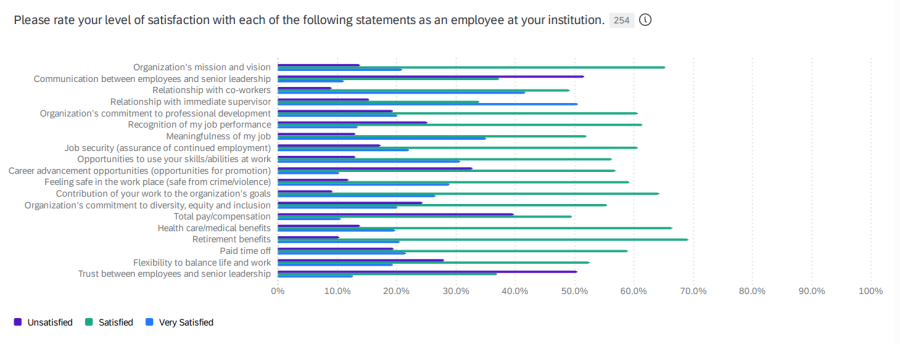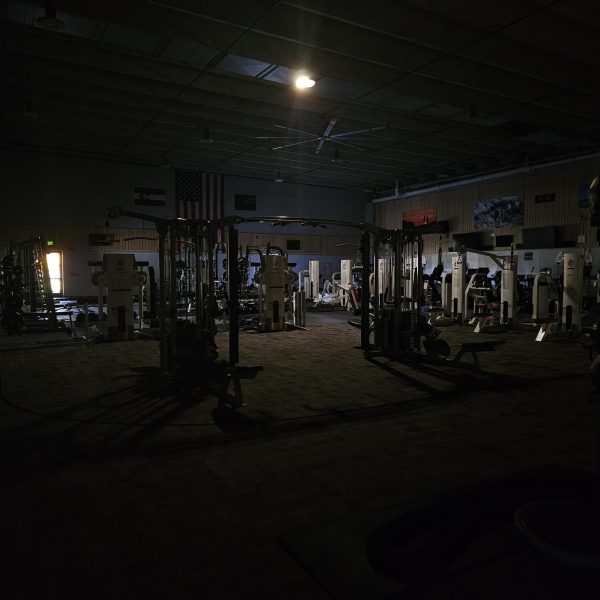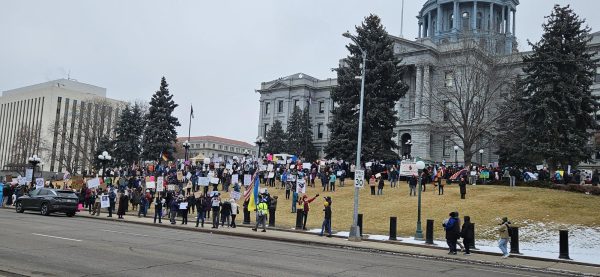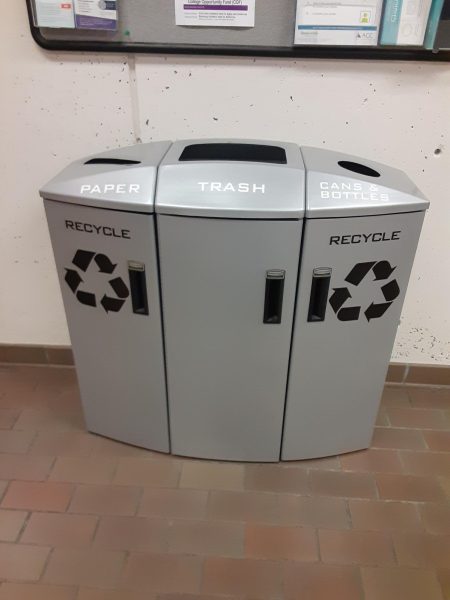Campus Climate Survey Calls for Communication, Transparency
Just like students getting their final grades at the end of the semester, Arapahoe Community College (ACC) received a grade this spring for all the work the college has done the last few years. That grade came in the form of a climate survey.
Colorado Community College System (CCCS) conducts a campus climate survey for all schools involved in the system. The survey is taken by active administrators, faculty, classified staff and instructors, and has been conducted every other year for the past 14 years. According to Lindsay Sandoval, a communications manager for CCCS, “The survey asks questions about leadership; relationships with supervisors; employee satisfaction and engagement; and diversity, equity and inclusion.”
RESULTS
The Pinnacle obtained ACC’s results of the CCCS Campus Climate survey through a Colorado Open Records Act request. At ACC, 254 people were surveyed across administrative, faculty, classified staff, and instructor positions. The results were generally positive. Most people surveyed reported being satisfied or very satisfied with ACC’s mission and vision, their relationships with their co-workers and immediate supervisor, the meaningfulness of their job and feeling safe at work, among other benefits.
Responses regarding Diversity, Equity, and Inclusion (DEI) work on campus were mixed. The majority of respondents, 91%, said that the organizations commitment to diversity, equity, and inclusion was either important or very important to them. Additionally, 76% of respondents said they were satisfied or very satisfied with the organization’s commitment to diversity, equity, and inclusion.
Some critics were clear with their disapproval in the comments section of the survey. “The DEI work that has been going on at the college is hostile…We have become snowflakes and are overly sensitive about everything. You cannot come to work and be your authentic self anymore, for fear of offending someone,” read one comment. Yet, others critiqued ACC for not doing enough. “A lot of the diversity and inclusion talk is just performance,” said another comment.
However, there were some questions that were answered with overwhelming negativity.
When asked if they were satisfied with the trust between employees and senior leadership, 50% of respondents said they were unsatisfied. This feeling was mirrored when asked if they were satisfied with communication between employees and senior leadership, with 52% of respondents saying they were unsatisfied.
Results continued to lean negative in other questions about senior leadership. In response to the statement “Senior leadership does a good job of communicating institutional goals and strategies” the majority of respondents (126) either disagreed or strongly disagreed, while 86 respondents agreed or strongly agreed.
Many of the comments about senior leadership at ACC mentioned need for better communication and transparency. “There has been very poor communication lately from senior leadership at ACC. Changes appear without any up front notification and we are left to seek answers on our own after the fact,” said one comment.
Another comment read that “several people have floated the idea of a vote of no confidence for Cheryl [Calhoun, ACC provost and vice president] and Stephanie [Fujii, ACC president]. If something doesn’t change, we will lose more of our great talent here. I don’t know a single person who likes or respects Cheryl. People are lukewarm on Stephanie.”
RECEPTION
ACC’s campus climate results were originally released to faculty and staff on Feb. 8, as a data set and summary of comments made in the survey. This meant that while faculty and staff were able to see most of the responses, they were unable to see any comments made on the survey.
According to Joan Anderssen, an economics professor at ACC and member of ACC’s Faculty Senate, this release caused controversy among faculty and staff. The summary of comments was mostly positive, despite some of the survey answers leaning more negative. Anderssen said when seeing the negative answers, “you think the comments are terrible and that the summary of comments just doesn’t share that.”
Danielle Staples, associate provost and dean of communication, humanities, art and design, said that faculty had expressed frustration because full results were not initially available, and that some felt it was a form of censorship. Staples added that “some of the comments were not constructive, some named people by name. [Leadership] valued the feedback but they wanted it to be a constructive form of feedback.”
Because of this, on Feb. 13, Anderssen, along with David Sackris and Kristine Doherty as members of ACC’s Faculty Senate, filed a Colorado Open Records Act request to see the comments. Their request was filled within a week and they had access to all the comments given in the survey.
Shortly after Faculty Senate received the comments, ACC released the comments to faculty and staff, so they were able to see all the responses to the survey. Provost and vice president Cheryl Calhoun said that the decision to release comments was not influenced by Faculty Senate’s records request, but rather an attempt to increase transparency at the school.
After full results were released, ACC hosted two town halls, one on Zoom and one on ACC’s Littleton campus, on March 3 to hear more feedback from faculty and staff. The town hall included a presentation on the survey results as well as a summary of the administration’s work moving forward. However, this left little time to listen to feedback.
According to Anderssen, because of the presentation, there was not enough time for everyone’s feedback to be heard or for their questions to be answered. Cheyne Bamford, a psychology professor at ACC, mirrored this, expressing that there was not enough time for people’s voices to be heard. “It was poor event planning,” said Bamford.
Staples was not surprised by the survey’s results. She said that “faculty and staff morale has been really low, ever since COVID hit. ACC wasn’t the only campus to do the survey, multiple schools did. And the themes were consistent throughout the [CCCS] system.”
IMPACT
This is the first CCCS Climate Survey for several members of ACC’s senior leadership, including president Stephanie Fujii as well as provost and vice president Cheryl Calhoun. It’s also the first CCCS survey conducted after the COVID-19 pandemic.
“With new leadership comes growing pains. This was an opportunity for people to share their growing pains of the new leadership,” said Staples.
Calhoun said the survey confirmed some issues senior leadership already knew needed work. “Many of us were brand new to the college, so it was a great learning experience as well,” Calhoun added.
Anderssen said that after the climate survey and town hall, communication between faculty and senior leadership was “better, but not where we’d like it to be.”
Though the climate survey results brought light to some of ACC’s weaknesses, Staples and Calhoun both expressed that this showed the areas that ACC needed to focus on improving, like communication and transparency.
“I think we need to talk about different avenues to provide feedback,” Staples said, “We’ve had a feedback gap for a while, and in my opinion feedback needs to go both ways. Because everybody can improve.”
The Pinnacle reached out to Fujii for comment. She denied the request, saying, “I am not sure I can be helpful and so I will decline.”

Lillian Fuglei (she/they) is a student at ACC currently working towards her Associate's in Journalism. She loves to write in any form they can, and has previously published articles with Colorado Community Media as well as poetry with...












Herm Jantzen, ACC founding faculty • Jun 13, 2023 at 9:14 am
Thanks to Lillian Fuglei for a very informative article!